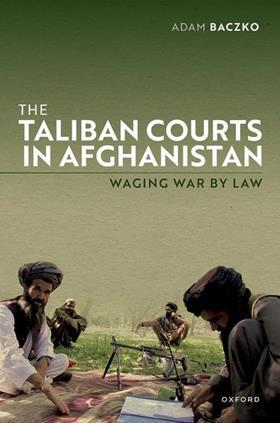The Taliban Courts in Afghanistan: Waging War by Law
Adam Baczko
£90, Oxford University Press
★★★✩✩
The right of access to independent courts presided over by trained judges who deliver effective judgments is an essential element of the rule of law. The thesis of this book is the courts set up by the Taliban, which began before the recent fall of the Afghan government supported by the West, offer a more stable, effective and popular form of justice than the official alternative. The author is a social scientist who has studied conflict and the book is the result of extensive research in the field.
This volume argues that these courts offer easy access to litigants, are cheap to use because they are not corrupt and the judges are well trained and independent, and the law is based on traditional and religious values which are what the public want. The case continues by saying Taliban courts contributed to the Taliban’s victory.

The Western-backed regime in Afghanistan is said to not have had wide respect or support. The figures on the problems with financing the government are staggering. Three quarters of the money sent to Afghanistan did not arrive in the country because it was allegedly spent on contractors who creamed off their cut. The country has a 95% poverty level. 500 trainers were paid more in salaries than the 62,000 members of the police service. An Afghan politician was found allegedly with $52 million in cash in a suitcase in Dubai airport. This was part of the 'capital flight', which does not mean travelling to another country but describes corrupt officials and politicians taking their ill-gotten gains overseas.
It is perhaps not surprising, given the alleged failings of the Western-style government, that the Taliban’s justice was more popular. Afghanistan has a complex history and diverse ethnicity and tribal background. The jurisdiction and legal system of Afghanistan in the early twentieth century was imposed on the country with little respect for the traditions. The government courts were, the book says, riddled with corruption and litigants were exhausted by constant delays and mounting costs of bribes. Judgments were ineffective and unenforceable. Afghan villagers did not have the money to pay bribes or the energy or time to follow the court rules which take years and years.
Taliban judges are selected and trained according to rules and not surprisingly courts had to be mobile for security reasons. These issues are essential in any society and it is a fascinating subject, based on the results of first-hand accounts and interviews. There are interesting comments and comparison with other regimes, where insurgents set up courts including the IRA who had a form of 'justice'.
It is a well-argued case and fascinating book on an interesting and not well-known country, but the reader may not agree with all the conclusions and arguments made.
David Pickup is a partner at Pickup & Scott Solicitors, Aylesbury































No comments yet